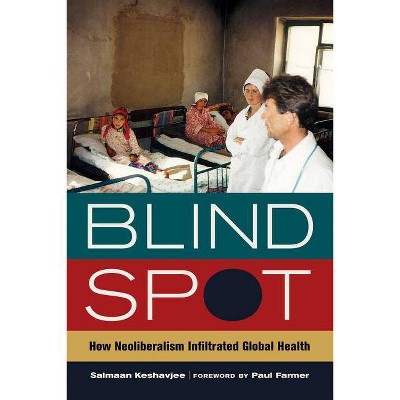Blind Spot, 30 - (California Public Anthropology) by Salmaan Keshavjee (Hardcover)

Similar Products
Products of same category from the store
AllProduct info
<p/><br></br><p><b> Book Synopsis </b></p></br></br>Neoliberalism has been the defining paradigm in global health since the latter part of the twentieth century. What started as an untested and unproven theory that the creation of unfettered markets would give rise to political democracy led to policies that promoted the belief that private markets were the optimal agents for the distribution of social goods, including health care.<br /><br />A vivid illustration of the infiltration of neoliberal ideology into the design and implementation of development programs, this case study, set in post-Soviet Tajikistan's remote eastern province of Badakhshan, draws on extensive ethnographic and historical material to examine a "revolving drug fund" program-used by numerous nongovernmental organizations globally to address shortages of high-quality pharmaceuticals in poor communities. Provocative, rigorous, and accessible, <i>Blind Spot</i> offers a cautionary tale about the forces driving decision making in health and development policy today, illustrating how the privatization of health care can have catastrophic outcomes for some of the world's most vulnerable populations.<p/><br></br><p><b> From the Back Cover </b></p></br></br>This excellent historical-anthropological case study documents how the market-based ideology of neoliberalism has shaped global health and development policy since the 1980s. Despite evidence to the contrary, this unquestioned (and ultimately harmful) set of ideas became the 'common sense' basis of a problematic health reform effort. With a sympathetic eye towards NGOs and local health practitioners in poverty-stricken Tajikistan, Keshavjee shows how a particular program failed but the underlying assumptions remained unstoppable. This elegantly written book exemplifies the power of shifting the anthropological analytical gaze to the social processes of policy formation that exacerbated the horrific post-Soviet mortality crisis.--Peter J. Brown, Professor of Anthropology and Global Health, Emory University <p/> All newcomers to the work of global health should read this book. Writing elegantly about the devastating effects of the Bamako Initiative, but more importantly about the history of neoliberalism itself, Keshavjee offers a cautionary lesson to those who are still enthusiastic about allowing market-driven policies to guide our global health work. Indeed, the case of reduced access to drugs in the post-Soviet Tajikistan community of Badakhshan presents a stunning example of the hypocrisy, ideological blindness, and institutional failures that allowed the principles of supply side economics to both inform the provisioning of health care resources and, ultimately, derail even the best intentions of many a good NGO or global health worker, including physicians like Keshavjee himself.<i> Blind Spot</i> is a quick and pithy study of a problem that refuses to go away.--Vincanne Adams, Professor of Medical Anthropology at the University of California, San Francisco, and author of <i>Markets of Sorrow, Labors of Faith: New Orleans in the Wake of Katrina</i> <p/> <i>Blind Spot</i> provides a singularly nuanced critique of neoliberal health policies as they play out on the ground in a desperately impoverished, post-war, post-Soviet setting. Taking readers from the boardrooms of Geneva to the high mountains of Tajikistan, this book is bound to become a classic in medical anthropology and critical global health studies. There is no other book quite like it.--Marcia Inhorn, William K. Lanman Jr. Professor of Anthropology and International Affairs at Yale University <p/> Keshavjee's <i>Blind Spot</i> is quite possibly the most important ethnography of social development under neoliberalism applied to health that has been written to date. It is a telling moral lesson in how humanitarian assistance--despite its noble intentions--fails and actually at times even intensifies social suffering.--Arthur Kleinman, Harvard University<p/><br></br><p><b> Review Quotes </b></p></br></br><br>"<i>Blind Spot</i> provides much greater clarity in our understanding of the specific agendas promoted by neoliberalism, including the distinct forces involved and their relation to health delivery programs."-- "American Anthropologist"<br><br>An accessible summary of the rise of neoliberalism following World War II and its impact on global health and development programs into the late 20th century and beyond. . . . A valuable resource.-- "American Journal of Human Biology"<br><p/><br></br><p><b> About the Author </b></p></br></br><b>Salmaan Keshavjee</b> is a physician and anthropologist with more than two decades of experience working in global health. He is the Director of the Program in Infectious Disease and Social Change in the Department of Global Health at Harvard Medical School, where he is also Associate Professor of Global Health and Social Medicine and Associate Professor of Medicine. He also serves on the faculty of the Division of Global Health Equity (DGHE) at Boston's Brigham and Women's Hospital, and is a physician in the Department of Medicine. <p/><b>Paul Farmer </b>is cofounder of Partners In Health and Chair of the Department of Global Health and Social Medicine at Harvard Medical School. His most recent book is <i>Reimagining Global Health</i>. Other titles include <i>To Repair the World;</i><i> Pathologies of Power: Health, Human Rights, and the New War on the Poor</i><i>;</i><i> Infections and Inequalities: The Modern Plagues</i><i>;</i> and <i>AIDS and Accusation: Haiti and the Geography of Blame</i>, all by UC Press.
Price History
Price Archive shows prices from various stores, lets you see history and find the cheapest. There is no actual sale on the website. For all support, inquiry and suggestion messagescommunication@pricearchive.us



















